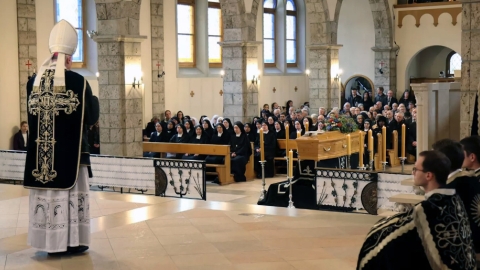Cardinal Marx Has Submitted His Resignation

Cardinal Reinhard Marx handed the Pope his letter of resignation as Archbishop of Munich and Freising, dated May 21, which so far has not been accepted by Francis. The letter was published on June 4. This procedure and the contents of the letter are puzzling.
Cardinal Marx is only 67 years old. Under the new canon law, bishops must submit their resignations to the Pope when they reach the age of 75. This move therefore seems premature for one who seen as a “heavyweight” of the Church in Germany.
The high prelate has a responsibility to Rome itself, where he was called by Pope Francis in 2013 to be part of the “council of cardinals.” This small circle, which has a varying number of members, is responsible for providing support to the Pope, particularly regarding the reform of the Roman Curia.
A first question arises: Why did Cardinal Marx want to make his letter of resignation public? This is an unusual procedure. It can be understood in certain special circumstances, but in this case?
It seems obvious that the prelate wants to make it known, urbi et orbi, why he is resigning. Say it and proclaim it from the pulpit in some way. In other words, it smacks of “PR gimmick” to send a message. But what is the message?
Cardinal Marx's letter opens with an observation about the crisis of the Church in Germany. This seems to him to lead to a real “stalemate,” which could however lead to a revival.
Then he indicates that his resignation is a way for him to assume his “co-responsibility for the sex abuse disaster.” And to take up a worn-out refrain: “The investigations and assessments of the past ten years have continued to show that there have been both personal failures and administrative errors, but also an institutional failure.”
These personal failings and this “institutional failure ... necessitate a change and a reform of the Church.” The high prelate proposes the Synodal Path as the only possibility to get out of this crisis. There must be a necessary change of perspective.
Cardinal Marx then referred to the famous MHG report on abuses in Germany made by independent academics which concluded, among other things, to necessity of reforming the power system in the Church.
While it may not be permissible to doubt the sincerity of Cardinal Marx feeling co-responsible for the crisis of abuses, it is, however, permissible firstly to be surprised at the staging of a such a decision, and, secondly, to refuse the analysis that he persists in wanting to impose on the origin of this crisis.
This crisis is an integral part of the post-Vatican II crisis in the Church. Of course, the Council is not at the origin of all the elements of this crisis, but it generated some and was the catalyst for others.
The first element is the loss of zeal and a strong faith among the clerics. This element began before the Council, but it was increased tenfold by this event. The terrible wave of abandonment of the priesthood in the post-conciliar period - around 70,000 - is a sure indication of this.
Pope Emeritus Benedict XVI, witnessed this abandonment as cardinal, while he was at the head of the Congregation for the Doctrine of the Faith. He gives as the first element of the crisis of abuse the social context of the liberation of morals: “in the 1960’s an egregious event occurred, on a scale unprecedented in history. It could be said that in the 20 years from 1960 to 1980, the previously normative standards regarding sexuality collapsed entirely.”
What also should be remembered on this subject were the pansexual claims and the promotion of pedophilia. The clergy, in turmoil, were unfortunately not spared by this movement.
A second cause is linked to the revolution in moral theology and the Church’s teaching on mores: “Until the Second Vatican Council, Catholic moral theology was largely founded on natural law….”
“In the Council's struggle for a new understanding of Revelation, the natural law option was largely abandoned, and a moral theology based entirely on the Bible was demanded.” A strong admission: the Council is responsible for the abandonment of natural law. Hence the innumerable excesses of moral relativism.
Finally, a third cause is found in the rejection of the magisterium of the Church, which is no longer recognized as infallible in matters of morals. This leads in thinking that “the Church does not and cannot have her own morality.” From that point on, anything - or almost anything - is possible.
For the former pope, the causes he brought to light led to three essential ruptures.
A rupture in formation in the seminaries: “as regards the problem of preparation for priestly ministry in seminaries, there is in fact a far-reaching rupture with the previous form of this preparation.” This break in formation allowed that, “in various seminaries homosexual cliques were established, which acted more or less openly and significantly changed the climate in the seminaries.”
A rupture in the recruitment of bishops: in this climate of moral collapse, Joseph Ratzinger recognizes that the application of the Council had the effect of promoting pastors who are insufficiently formed for their tasks within the hierarchy of the Church. Concretely, “a criterion for the appointment of new bishops was now their ‘conciliarity,’ which of course could be understood to mean rather different things. Indeed, in many parts of the Church, conciliar attitudes were understood to mean having a critical or negative attitude towards the hitherto existing tradition.”
A rupture in canon law: Benedict XVI takes up the question of pedophilia and the inadequacy of the means to repress it that were provided by the new Code of Canon Law, promulgated in 1983: “The question of pedophilia...did not become acute until the second half of the 1980s.” The bishops, “sought help, since canon law, as it is written in the new (1983) Code, did not seem sufficient for taking the necessary measures.”
This point was particularly well documented in the interview recently given by Msgr. Arrieta on the occasion of the revision of Book VI of the 1983 Code.
Cardinal Marx, along with the German clergy, continues to be blind to the causes of the crisis and to crave an institutional reform of the Church, which is at the heart of his resignation. But the Church cannot - institutionally - change, for her structure is supernatural and revealed.
(Sources : cath.ch/Vatican news – FSSPX.Actualités)
Illustration : Degreezero, CC BY-SA 4.0, via Wikimedia Commons





